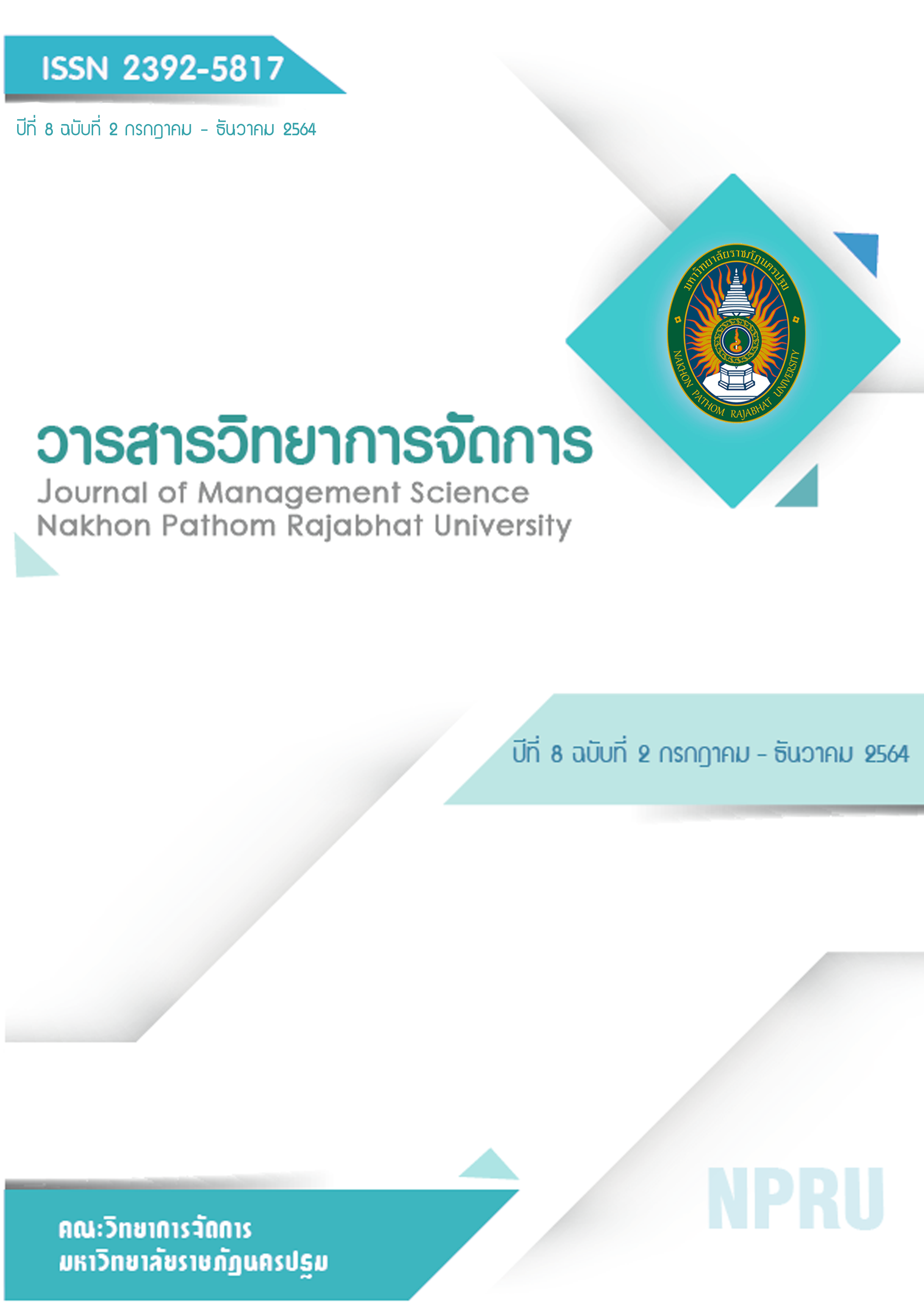Factors affecting entrepreneurial intentions of 4th Year Students, General Management, Nakhon Pathom Rajabhat University
Main Article Content
Abstract
The purpose of this research is 1) to study the level of opinions on entrepreneurial characteristics, attitude towards Entrepreneurship, perceived ability of entrepreneurship, entrepreneurial education and entrepreneurial intentions of the Fourth Year Students in General Management, Nakhon Pathom Rajabhat University 2) to study the factors affecting entrepreneurial intentions of the 4th year students in General Management, Nakhon Pathom Rajabhat University. Using a quantitative research methodology, sample used in this research is a 4th year student in General Management, Nakhon Pathom Rajabhat University, total 191 people by quota sampling method. The data were analyzed by descriptive statistics such as frequency, percentage, mean and standard deviation and inferential statistics used stepwise multiple regression analysis.
The results of the research were as follows: 1) the level of opinion on entrepreneurial characteristics, attitude towards Entrepreneurship, perceived ability of entrepreneurship, entrepreneurial education and entrepreneurial intentions of the 4th Year Students in General Management, Nakhon Pathom Rajabhat University was in all high levels. 2) attitude towards Entrepreneurship factors, perceived ability of entrepreneurship and entrepreneurial education positively affecting entrepreneurial intentions of the fourth-year students in General Management, Nakhon Pathom Rajabhat University statistically significant and has a forecasting power of 59.00 percent. The equation was as follows:
Y ̂tot= 0.544 + 0.183** (X3) + 0.104** (X2) + 0.093** (X4)
Article history : Received 8 March 2021
Revised 18 April 2021
Accepted 28 April 2021
SIMILARITY INDEX = 2.82 %
Article Details

This work is licensed under a Creative Commons Attribution-NonCommercial-NoDerivatives 4.0 International License.
The views and opinions of the article appearing in this journal are those of the author. It is not considered a view and responsibility of the editorial staff.
References
กัลยารัตน์ ธีระธนชัยกุล. (2562). การเป็นผู้ประกอบการและการสร้างธุรกิจใหม่. กรุงเทพฯ: ซีเอ็ดยูเคชั่
กรุงเทพธุรกิจ.(2563). เศรษฐกิจโลก 2020 : เรื่อยๆ มาเรียงๆ. [ออนไลน์]. สืบค้นเมื่อ 1 กุมภาพันธ์ 2563 จาก https://www.bangkokbiznews.com/news/detail/863821
ณัฐพล ประดิษฐผลเลิศ. (2560). Startup คิดให้ดัง ทําให้รวย. กรุงเทพมหานคร: โมเมนตั้ม.
มารยาท โยทองยศ และ ทรงวาด สุขเมืองมา. (2559). ปัจจัยที่มีอิทธิพลต่อความตั้งใจที่จะเป็น ผู้ประกอบการของนักศึกษาปริญญาตรี:กรณีศึกษามหาวิทยาลัยกรุงเทพ. สุทธิปริทัศน์, 95(3), 103-115.
เมธาวี เกียรติพรพิเชฐ และจรัญญา ปานเจริญ. (2560). คุณลักษณะและความตั้งใจที่จะเป็นผู้ประกอบการของนักศึกษาระดับปริญญาตรี ในมหาวิทยาลัยธุรกิจบัณฑิตย์. [ออนไลน์]. สืบค้นเมื่อ 18 ธันวาคม 2563, จาก https://grad.dpu.ac.th/upload/content/files/202/7-2-15.pdf
สุชาติ ประสิทธิ์รัฐสินธุ์. (2544). ระเบียบวิธีการวิจัยทางสังคมศาสตร์. (พิมพ์ครั้งที่ 11). กรุงเทพมหานคร: เฟื่องฟ้า พริ้นติ้ง.
สุชาติ ไตรภพสกุลและชาคริต พิชญางกูร. (2561). ปัจจัยเชิงสาเหตุต่อการเป็นผู้ประกอบการรุ่นเยาว์ของประเทศไทย. วารสารบริหารธุรกิจ นิด้า, 22(1), 44-60.
สำนักงานคณะกรรมการพัฒนาการเศรษฐกิจและสังคมแห่งชาติ. (2560). แผนพัฒนาเศรษฐกิจและสังคมแห่งชาติฉบับที่สิบสอง 2560-2564. [ออนไลน์]. สืบค้นเมื่อ 2 กรกฎาคม 2563, จาก https://www.nesdc.go.th/
สำนักวิชาการและงานทะเบียน มหาวิทยาลัยราชภัฏนครปฐม. (2563). จำนวนนักศึกษาชั้นปีที่ 4 สาขาวิชาการจัดการทั่วไป มหาวิทยาลัยราชภัฏนครปฐม. [ออนไลน์]. สืบค้นเมื่อ 2 กรกฎาคม 2563, จากdhttps://reg.npru.ac.th/registrar/studentset.
อนงค์ รุ่งสุข. (2559). ปัจจัยที่มีผลต่อความตั้งใจที่จะเป็นผู้ประกอบการของนักศึกษาคณะบริหารธุรกิจ มหาวิทยาลัยเทคโนโลยีราชมงคลรัตนโกสินทร์. วิทยานิพนธ์บริหารธุรกิจมหาบัณฑิต.มหาวิทยาลัยเทคโนโลยีราชมงคลรัตนโกสินทร์.
Ajzen, I. (1991). The theory of planned behavior. Organizational behavior and human
decision processes, 50(2), 179-211.
Erdfelder, E., Faul, F., & Buchner, A. (2007). G*Power 3: A flexible statistical power analysis program for the social, behavioral, and biomedical sciences. Behavioral Research Method, 39, 175-191.
Daft, R. (2017). The leadership experiences. USA: Cengage Learning.
Nguyen Anh Tuana,, Do Thi Hai Hab, Vu Thi Bich Thaoc, Dang Kim Anhd, Nguyen Hoang Long. (2019). Factors affecting entrepreneurial intentions among youths in Vietnam. Children and Youth Services Review, 99(2019), 186-193.
Radzi, K. M., Nor, M. N. M., and Ali, S. M. (2017). The impact of internal factors on small business success: A case of small enterprises under the FELDA scheme. Asian Academy of Management Journal, 22(1), 27.
Straub, J. T. and Attner, R. F. (1994). Introduction to Business. (5th ed.). Belmont, CA: Wadsworth.


